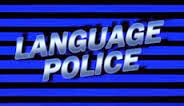Doubts about "correct" language! We all have them from time to time. My doubts occur as a slightly unpleasant feeling somewhere in my body (stomach? brain?). I remember having those feelings especially when I worked in an academic environment. After all, someone (heaven forbid!) might criticize my language use.
For example, I often needed to talk about more than one syllabus. So were they "syllabi" or "syllabuses"? The plural form of "curriculum" was a constant decision - were they "curricula" or "curriculums"? The word "data" often came up in class. Should I use "the data is" or "the data are"? Would I be attending several "symposia" or "symposiums" during the year? So many decisions!
A quick glance at my trusty Merriam Webster Dictionary just set my mind somewhat at ease. Each of the alternate forms above were listed as correct. I had done some unnecessary worrying. But the fact remains that even if a form is listed as correct in a dictionary, if that form is not used by others in a certain environment, I would probably still choose the form that would draw the least amount of negative attention to my language. That decision gives me full membership in the woos club.
 |
| Watch out! They are everywhere! |
The larger world of conversation also has its language traps. "I couldn't care less" is often jumped on by the double negative watchdogs and changed into "I could care less," Should a blanket tag be marked as "flammable" or "inflammable"? Does "media" always take a plural verb? What exactly does the phrase "begs the question" mean? Does "decimate" still have to refer to the destruction of only ten percent? Pronunciation decisions also disturb our calm existence. Do you pronounce the "p" in "comptroller"?
And how about an adverb that often draws censure such as "hopefully" when it is used to refer to an entire sentence as in, "Hopefully, we won't be making so many mistakes in the future."? Would you feel comfortable saying that sentence? If you have strong feelings one way or the other, you may want to listen to or read what an NPR commentator has to say about this topic at The Word 'Hopefully' Is Here To Stay, Hopefully.
One source I would recommend to quiet your grammar fears is Origins of the Specious: Myths and Misconceptions of the English Language by Patricia T. O'Conner and Stewart Kellerman. I can almost guarantee this book will make you relax a little if you are an uptight language user, and it will certainly bring a smile to your face.
Now, let's see. I've banished my language doubts. What else is on my worry list for today?


No comments:
Post a Comment